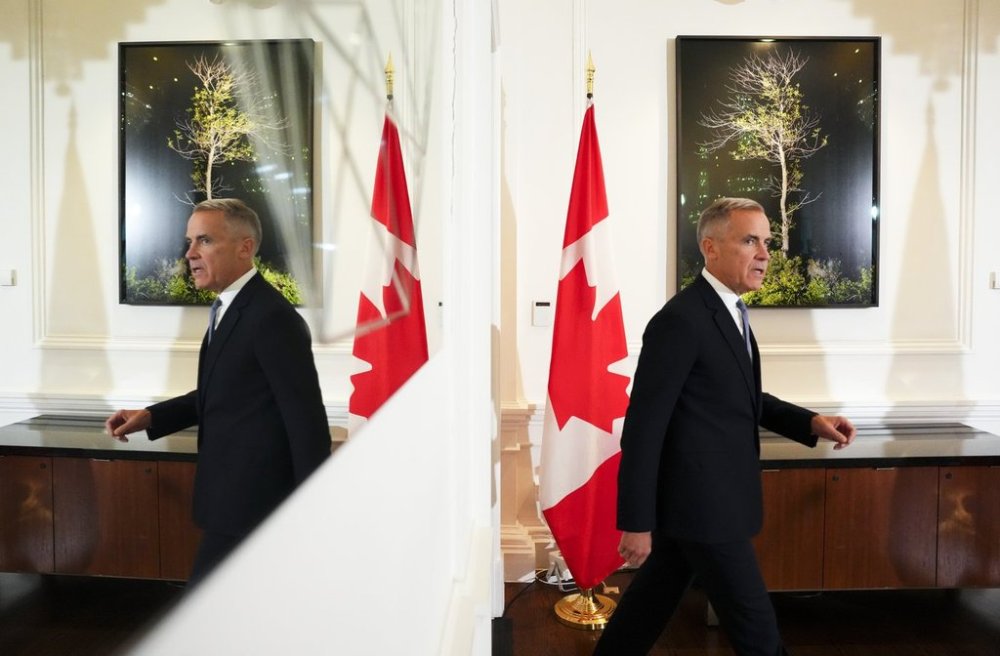Science
U.S. Visa Fee Sparks Potential Tech Migration to Canada

Prime Minister Mark Carney has identified a significant opportunity for Canada to attract global tech talent following the announcement of a substantial $100,000 fee for temporary H-1B visas in the United States. This new fee, introduced under the previous administration, is aimed at skilled workers, particularly in the technology sector, and could influence migration patterns between the two countries.
The introduction of this hefty visa fee could deter potential applicants from seeking employment in the U.S., where the H-1B visa has traditionally served as a pathway for high-skilled workers. According to Pew Research, approximately 60 percent of H-1B visas issued since 2012 were granted to individuals in computer-related fields. Previously, the application fee for this visa was only $215.
Impact on Migration Trends
In a press conference held in London, Carney stated, “Not as many of those people are going to get visas to the United States. And these are people with lots of skills that are enterprising, and they’re willing to move to work.” He emphasized that Canada must capitalize on the situation to enhance its appeal to international tech workers.
Despite this potential influx, experts caution that the increased visa costs might inadvertently accelerate the trend of skilled workers migrating to the U.S. Angus Lockhart, a senior policy analyst, noted that tech jobs in the United States typically offer salaries around 46 percent higher than those in Canada, incentivizing local talent to seek opportunities south of the border.
Carney’s remarks coincide with Canada’s broader immigration strategy, which aims to reduce the percentage of non-permanent residents to 5 percent of the population by 2027. As of April 1, 2025, non-permanent residents accounted for 7.1 percent of Canada’s population, a slight decrease from 7.4 percent earlier in the year, according to Statistics Canada.
Alternative Visa Options and Industry Observations
Canadian tech professionals seeking to work in the U.S. still have access to the TN visa through the Canada-United States-Mexico Agreement (CUSMA). Benjamin Bergen, president of the Council of Canadian Innovators, suggested that the new H-1B fee might prompt American firms to consider Canadian candidates more seriously, especially if U.S. labor shortages arise.
Some U.S. tech companies have developed a workaround for hiring foreign talent by employing individuals in Canadian branches and subsequently transferring them to the U.S. Bergen humorously referred to this process as treating Vancouver like “Ellis Island,” where employees spend a year in Canada before being relocated.
Lockhart highlighted that while the high fee may not deter firms from hiring top-tier talent, it could significantly influence decisions for lower-paid positions in the tech sector. “No company is going to balk at that and say, ‘We can’t hire this person we wanted to pay $5 million to because they had to pay a one-time $100,000 fee,” he explained. “But for a lot of other tech workers, the bulk of the tech work population that is making more so in the low six figures range, the $100,000 does become an issue.”
To effectively attract international talent, Bergen stressed that Canada must foster an environment conducive to the growth of tech companies and startups. He criticized the current approach, stating that Canada often does not procure from its own vendors and needs a comprehensive strategy to support its tech ecosystem. “It can’t just be this sort of whack-a-mole, knee-jerk reaction,” he said.
As businesses and governments navigate these changes in immigration policy, the landscape for tech talent may shift dramatically, potentially positioning Canada as an attractive alternative for skilled workers who otherwise would have pursued opportunities in the United States.
This report was initially published on October 4, 2025, and includes information from credible sources, including the Economic Policy Institute and various industry experts.
-

 Science3 months ago
Science3 months agoToyoake City Proposes Daily Two-Hour Smartphone Use Limit
-

 Top Stories3 months ago
Top Stories3 months agoPedestrian Fatally Injured in Esquimalt Collision on August 14
-

 Health3 months ago
Health3 months agoB.C. Review Reveals Urgent Need for Rare-Disease Drug Reforms
-

 Technology3 months ago
Technology3 months agoDark Adventure Game “Bye Sweet Carole” Set for October Release
-

 World3 months ago
World3 months agoJimmy Lai’s Defense Challenges Charges Under National Security Law
-

 Lifestyle3 months ago
Lifestyle3 months agoVictoria’s Pop-Up Shop Shines Light on B.C.’s Wolf Cull
-

 Technology3 months ago
Technology3 months agoKonami Revives Iconic Metal Gear Solid Delta Ahead of Release
-

 Technology3 months ago
Technology3 months agoApple Expands Self-Service Repair Program to Canada
-

 Technology3 months ago
Technology3 months agoSnapmaker U1 Color 3D Printer Redefines Speed and Sustainability
-

 Technology3 months ago
Technology3 months agoAION Folding Knife: Redefining EDC Design with Premium Materials
-

 Business3 months ago
Business3 months agoGordon Murray Automotive Unveils S1 LM and Le Mans GTR at Monterey
-

 Technology3 months ago
Technology3 months agoSolve Today’s Wordle Challenge: Hints and Answer for August 19









